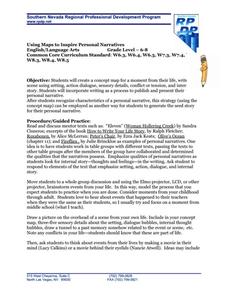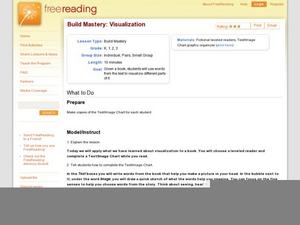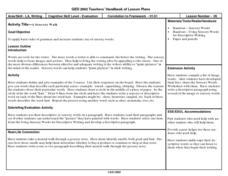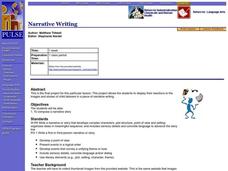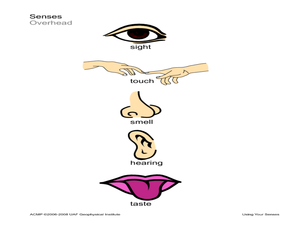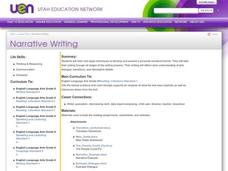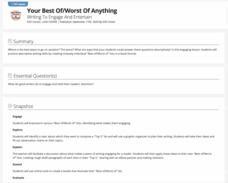University of Minnesota
Attention and Sensory Processing
Ever wondered how your brain manages all of the information it receives every second of every day? The sights, the sounds, the smells ... each one filed away for later use or moved to the front of the line so your body can react. Through...
Curated OER
A Seashell Lesson: Writing for Detail and the Scientific Process
Practice descriptive language in this lesson, which prompts elementary and middle schoolers to write detailed descriptive sentences describing a seashell. They write a description of a shell, create an illustration, and other students...
EngageNY
Storyboard Revision: Managing the Sequence of Events and Using Sensory Details
Mastering techniques from the resource, pupils give life to their writing, revising their storyboards to include sensory details and transitions. To finish, they participate in a peer critique process and use the feedback to further...
Curated OER
Borrowing Narrative Skills from Mr. Fletcher: Using a "Prompts in Reverse" Technique to Inspire Your Writers
Help your class find their writing voices with this lesson which uses the work of Ralph Fletcher to guide a "Prompt in Reverse" activity. Using the chapter "First Pen" from Fletcher's Marshfield Dreams, learners decipher what they...
Southern Nevada Regional Professional Development Program
Using Maps to Inspire Personal Narratives
A solid description of one way to teach narrative writing, this resource outlines the writing process from concept to completion. Class members create concept maps of moments in their lives and follow the writing process to publish their...
Curated OER
Editing Marks, Part 1
Dander from the show Twisted Whiskers and characters from My Little Pony are featured in this three part lesson that explores using story pyramids to scaffold ideas, adding sensory details to enrich writing, and editing using common...
Curated OER
Build Mastery: Visualization
What do you see? Young reader tap into the visualization process as they listen to or read a fiction story and fill out a graphic organizer. Model this first with a think-aloud, showing scholars how you visualize a familiar story. For...
Curated OER
A Sensory Walk
Students define and give examples of five senses, compiling a list of sensory words to be used in a written descriptive paragraph.
Curated OER
Narrative Writing
Imagine a day in the life of a child who has to work 12-14 hours a day, seven days a week. After viewing images and reading stories of child laborers, class members select an image and write a richly detailed narrative about a typical...
K20 LEARN
Who Am I? Creating And Editing Descriptive Writing
With descriptive writing, the pleasure is in the details. Young writers learn how to add sensory details to a paragraph about themselves. They read a short paragraph and identify the sensory details used. After revising their draft...
Curated OER
Sense Poetry
Access your young poets' senses and emotions with this activity, which guides them through the process of writing a "sense poem." After working on a sense poem as a class and modeling the procedure, individuals work on their own poems...
Curated OER
Dear Diary
Work on narrative writing with this lesson, in which middle schoolers analyze the characters from a selected piece of literature and write narrative diary pieces as the character. They work to understand the point of view of the...
Smithsonian Institution
A Ticket to Philly—In 1769: Thinking about Cities, Then and Now
While cities had only a small fraction of the population in colonial America, they played a significant role in pre-revolutionary years, and this was certainly true for the largest city in the North American colonies: Philadelphia. Your...
Curated OER
The Sound of…Poetry!
Scritch, scratch, scritch. It's the sound of pupils writing poetry! Focus on sensory language and onomatopoeia with a writing lesson. After listening to some sounds, learners examine a couple of poems that include sound words and then...
Curated OER
Vivid Verbs
Spice up your writing! Your amateur writers will benefit from concentrating on understanding and improving verb use in writing. An introductory activity addresses weak verbs. A second exercise helps them see the importance of strong...
EngageNY
Writing the Children’s Book: Day One
With a brief mini-lesson, scholars learn about using strong verbs, sensory details, and precise descriptions. Next, pupils continue working on their children's book storyboards before choosing their strongest pages for peer critiques.
Curated OER
To Market
Students examine the process of cooking a meal. In this cooking background lesson, students explore cooking utensils, recipes, songs, and literature. They go through stations that encourage dramatic play and hands-on exploration of...
Poetry Society
A Conceit Poem
Young writers needn't be self-involved to craft a conceit. Directions for how to craft this form of extended metaphor, models, and a worksheet are all included in the packet.
Curated OER
Transforming Negatives to Positives
Students write diamonte poems that correspond to the double-exposed photograph they created. In this poetry and multimedia artwork lesson, students use the photographic process to create a double-exposed photo then create...
Curated OER
Using Your Senses
Students make observations. In this sensory skills lesson, students use their senses as well as tools that sharpen their senses to make observations regarding foods and other items.
Curated OER
Sensory Competition
Students explore examining something through one sense but experience competing input with another. The instructional activity also shows the plasticity of the brain and other cognitive functions.
Curated OER
Picture This
Elementary writers practice writing descriptive paragraphs by adding adjectives and sensory words to their writing. They use a picture of a monster for their descriptive paragraph. This 12-page lesson should increase your charges...
Curated OER
Narrative Writing
Binoculars are used as a metaphor for good descriptive writing. Class members first view a small picture and then an enlarged view of the same image in which the details come into focus. Next, learners examine a paragraph lacking sensory...
K20 LEARN
Your Best Of/Worst Of Anything: Writing To Engage And Entertain
It was the best of places! It was the worst of places! Middle schoolers practice their descriptive writing skills by creating an e-book about the best of/worst of topics. A series of activities about descriptive writing and worksheets...




